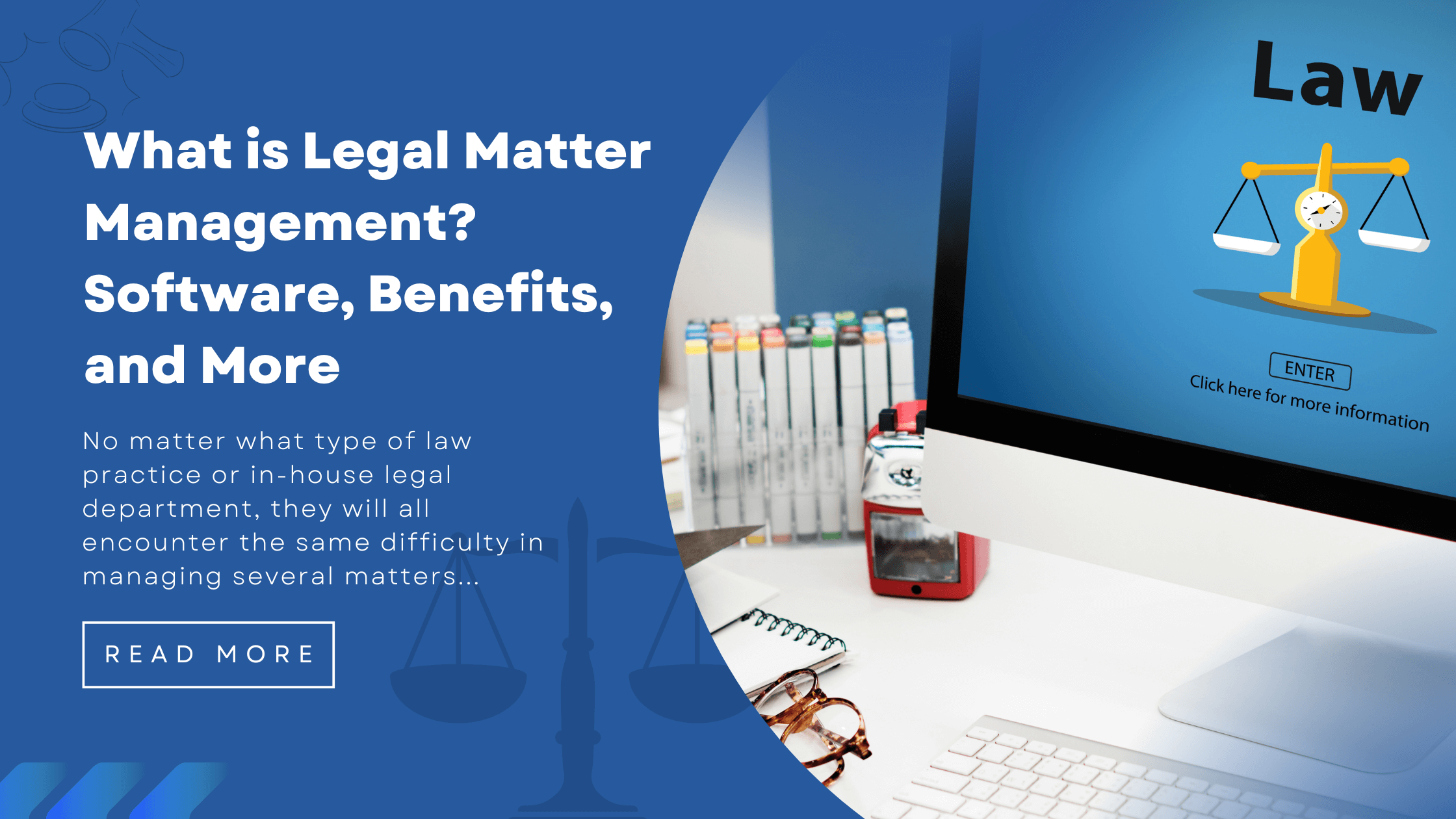No matter what type of law practice or in-house legal department, they will all encounter the same difficulty in managing several matters that across clients, contracts, litigations, compliance, and internal requests. A lack of structure leads to information being scattered, deadlines being missed, and productivity being affected.
Legal matter management is the structure and discipline applied to these workflows, and its software is the tool that makes it possible. Through this article, you will understand what legal matter management is, how it gets support from dedicated legal matter management software, the primary advantages, and what to consider when choosing a solution.
What is Legal Matter Management?
Legal matter management (LMM) signifies undertaking a systematic manner to oversee all stages of a legal “matter”. A “matter” could be legal activities like a contract review, litigation file, regulatory compliance project, vendor agreement, or internal legal request.
Legal matter management entails monitoring lawyers and resources, managing budgets and invoices, overseeing ethics and conflicts, maintaining document repositories, and having an overall view of the legal work lifecycle.
One way to differentiate LMM from case management: the case management is usually associated with the litigation scenario (e.g., filings, court deadlines, discovery). Matter management, on the other hand, is more comprehensive. It not only encompasses litigation but all legal work types, including non-litigation tasks, regulatory, contracts, etc.
For legal teams within companies, matter management is a linking factor between legal work and business goals and risk control. On the other hand, for law firms, matter management acts as a mutual point for client servicing, billing, and case strategy.
How Legal Matter Management Software Works
The LMM software version merges all legal processes, documents, communication, and reporting into one unified system. The points below discuss its typical functioning:
• Central Intake & Triage: Legal requests coming from internal teams, clients, or other departments can only able to be submitted through a united portal or a common form. The system collects the most important metadata (matter type, urgency, requester) and directs the request to the appropriate person.
• Workflow & Task Automation: Predefined or configurable workflows handle tasks, approvals, reminders, escalations, and handoffs. This assures that there is uniformity in all matters.
• Document & Email Linkage: All documents, emails, notes, and versions are tied directly to the corresponding issue. This keeps everything in context and helps prevent the use of disorganized folders.
• Calendars, Deadlines & Alerts: The system tracks the significant dates (court dates, contract renewals, filing deadlines) and sends out reminders or escalates issues as the deadlines get close.
• Billing & Expense Tracking: Time, costs, fees, and budgets are logged for each case or client. The software can integrate with the billing or accounting systems.
• Reporting & Analytics: Dashboards and reports reveal metrics, for instance, matter volumes, turnaround times, budget versus spending, workload distribution, bottlenecks, and trends.
• Security & Permissions: Features like granular access control, audit logs, ethical walling, encryption, and compliance enhance the security of sensitive legal data.
Since these modules are located in a unified environment, users are not required to switch between emails, spreadsheets, contract systems, billing tools, and file shares. With legal matter management software, everything works around the matter.
Benefits of Legal Matter Management Software
Implementing a dedicated system brings about a set of clear advantages:
Centralized Organization & Less Fragmentation
Everything related to the matter (documents, communication, tasks) is gathered in one place. It cuts down the search time and confusion.
Automated Workflows, Less Manual Errors
The automation of routine operations (reminders, routing, document generation) not only decreases the likelihood of mistakes but also gives the employees a chance to perform more meaningful work.
Visibility & Management Insight Develop
The leadership will be able to tell easily which issues are taking long, who among the team is loaded, and bottlenecks will be detected quickly. This method enables an organization to allocate resources more effectively.
Risk Mitigation & Compliance
Deadline tracking, retention policies, conflict checks, and audit logs help to avoid malpractice, missed filings, or regulatory violations.
Better Client or Stakeholder Experience
Timely updates on the status of the case, reliable timelines, and fewer mistakes make the clients and stakeholders trust the legal service provider more and be more satisfied with the service.
Scalability & Efficiency Gains
The tool scales more smoothly than the cobbling together of spreadsheets and point tools of the same volume in matters. Many legal practitioners report significant savings in time.
Data-Driven Strategy
Thanks to strong analytics, the legal departments can decisively make their resource, staffing, and budget decisions based on real data rather than guesswork.
Final Thoughts
Legal Matter Management Software has become a basic necessity rather and it’s a tool for the legal practice of the future. It provides structure, visibility, control, and tactical insight, alongside efficiency.
So, if your legal operations are still based on spreadsheets, scattered systems, or manual tracking, it is high time for a change.
CaseQube is a solution that shapes itself according to your needs without compelling you to conform to a strict pattern. Unravel your matters, bring metrics to your practice, and enliven your legal operations with CaseQube. Our legal matter management software combines matter and document management, workflow automation, collaboration, and analytics that benefit both corporate legal teams and law firms.
Change your legal work from messy to neat. Let CaseQube take care of the rest.

